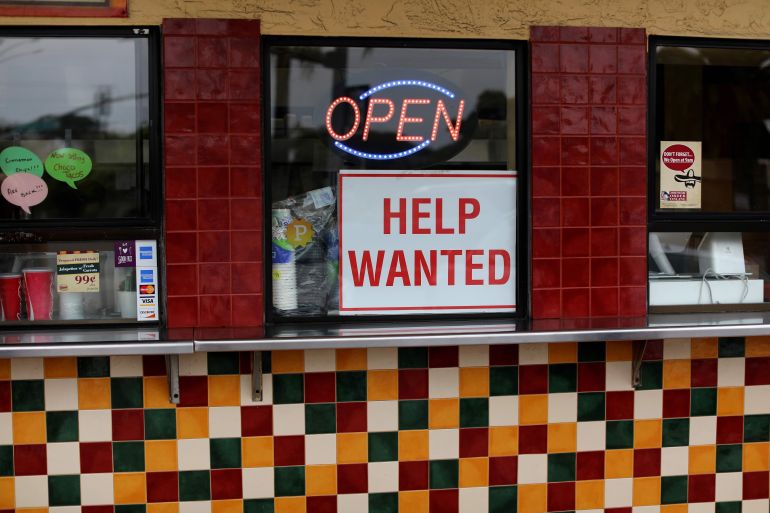US labour market still tight as unemployment hits 10-month high
Economists have cautioned against reading too much into the rise as the data are volatile around this time of year.

The number of Americans filing new claims for jobless benefits increased moderately last week, pointing to a still-tight and strong labour market despite growing fears of a recession as the United States Federal Reserve fights to dampen demand.
Though the weekly jobless claims report from the US Department of Labor on Thursday showed unemployment rolls, or the so-called continuing claims, rising to a 10-month high in late November, economists cautioned against reading too much into the move as the data are volatile around this time of year.
Keep reading
list of 4 items‘The Swimmers’: Can a movie change how people view refugees?
Bangladesh’s RAB received foreign intelligence training in the EU
US House of Representatives passes LGBTQ marriage protections
Labour market tightness and resilience keep the US central bank on course to continue hiking interest rates for a while.
“It is too early to interpret higher continuing claims as a signal of a loosening labour market,” said Isfar Munir, an economist at Citigroup in New York. “The holiday time is generally not attractive to workers to start a new job, compounded by many firms temporarily closing during the holiday period.”
Initial claims for state unemployment benefits increased 4,000 to a seasonally adjusted 230,000 for the week ended December 3. Last week’s increase was in line with economists’ expectations. Claims are well below the 270,000 threshold, which economists said would raise a red flag for the labour market.
Claims tend to be volatile at the start of the holiday season as companies temporarily close or slow hiring, which can make it hard to get a clear read of the labour market. They shot up to a three-month high a week before the Thanksgiving holiday, only to almost unwind the surge in the following week.
Nevertheless, there has been a rise in layoffs in the technology sector, with Twitter, Amazon and Meta, the parent of Facebook, announcing thousands of job cuts in November.
Unadjusted claims jumped 87,113 to 286,436 last week, driven by large increases in California, New York, Georgia and Texas. There were also notable rises in Illinois, Pennsylvania, Indiana, Ohio, New Jersey and Washington state.
The number of people receiving benefits after an initial week of aid, a proxy for hiring, increased 62,000 to 1.671 million in the week ending November 26, the claims data showed. That was the highest level in continuing claims since February.
The unemployment rate for people on jobless benefits increased to 1.2 percent, the highest since March, from 1.1 percent in the prior week. That suggests it is taking a bit longer for the unemployed to find work.
Stocks on Wall Street were trading higher. The dollar fell against a basket of currencies. US Treasury yields rose.
‘Modest easing’
“This might be a sign of a modest easing in the tightness of the labour market and, if it continues, it would sound a cautionary note on the outlook,” said Conrad DeQuadros, senior economic advisor at Brean Capital in New York.
But DeQuadros also warned that the data was difficult to seasonally adjust around Thanksgiving.
“We should wait to see if continuing claims continue to rise or whether the insured rate falls back modestly in the first week of December as it did in 2020 and 2021,” he said.
Other economists also struck a cautionary tone, arguing that adjusting the data for seasonal fluctuations with an alternative model showed a smaller increase than reported by the government.
“This could be particularly important for the continuing claims data that show a clear upward trend for filings in recent months in the official figures but less noticeable of a move up using some alternative seasonal adjustments,” said Daniel Silver, an economist at JPMorgan in New York.
Despite the recent steady rise in continuing claims, there has been no significant shift in labour market dynamics.
The government reported last week that nonfarm payrolls increased by 263,000 jobs in November. Economists say technology firms are right-sizing after over-hiring during the COVID-19 pandemic, noting that small firms remain desperate for workers.
Businesses are also hoarding workers after difficulties finding labour in the aftermath of the pandemic. There were 1.7 job openings for every unemployed person in October.
The Fed wants to slow the labour market to cool inflation and has raised its policy rate this year from near zero to a 3.75 percent to 4 percent range in the fastest rate-hiking cycle since the 1980s.
Economists expect the Fed will continue tightening monetary policy and lift the policy rate to a level higher than the recently projected 4.6 percent, where it could stay for some time.
Initial and continuing claims are expected to gradually rise, largely driven by white-collar layoffs.
“There will likely be more layoffs among white-collar positions because of labour supply constraints, which are less binding among white-collar positions,” said Nancy Vanden Houten, lead US economist at Oxford Economics in New York. “Businesses are hoarding low-skilled workers because they have been difficult to find and retain.”